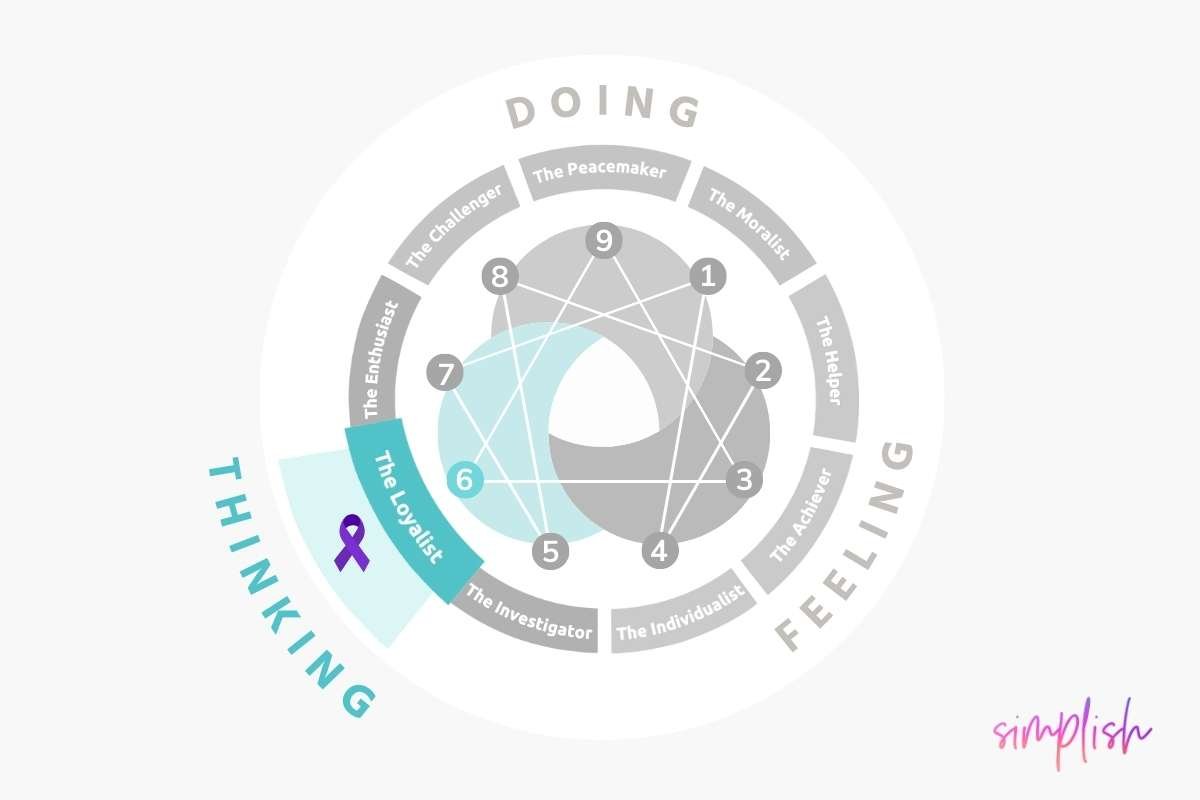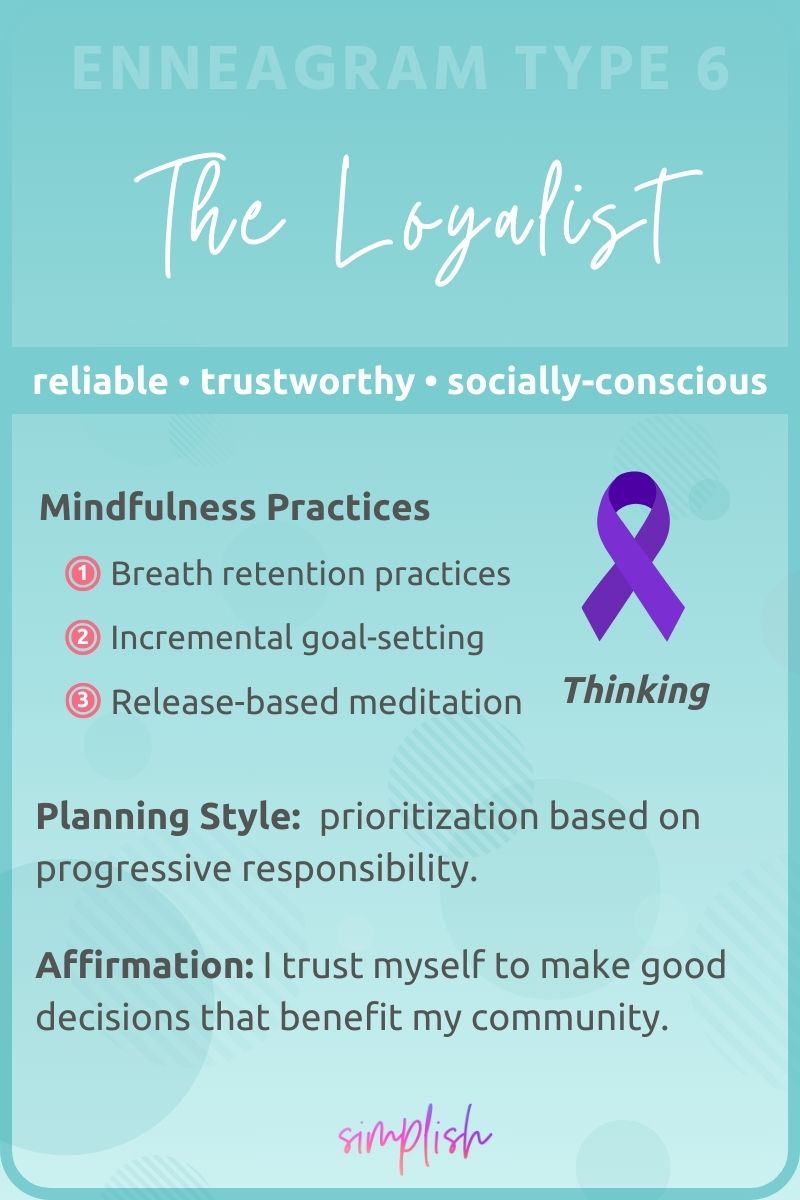Enneagram Type 6: The Loyalist
We typically think of “The Loyalist,” the type 6 enneagram personality, as a rule-follower, but they are also fiery revolutionaries when committed to beliefs instead of institutions. Whatever the object of their allegiance, Loyalists find their purpose through full commitment. When it comes to their relationships and ideas, they will hold on no matter what, even challenging authority figures to stay true to their convictions. While known as reliable right-hand partners, they can also be rebellious, revolutionary, and even authoritarian when their power is unchecked.
Loyalists tend to be depicted as the trusty side-kick in the film; Batman’s Robin and Wallace’s Gromit are iconic Loyalists with unwavering loyalty and determination to do what's right despite the danger.
If you've got a Type 6 friend or loved one in your life, understanding their loyalty and commitment can help you connect with them on a deeper level. So, let's dive into the world of the Enneagram Type 6 in-depth!
Motivation: The Enneagram Type 6 is primarily motivated by a desire for security and stability in their relationships, beliefs, and environment.
Their basic desire for security can manifest in various ways, including a strong loyalty and commitment to their community and a tendency to question authority or challenge established systems to create a more stable and secure future. As a Type 6, you might crave certainty and reassurance.The Struggle: Loyalists are fans of how things are, and they tend to resist change when they feel threatened. The basic dilemma for Loyalists is accepting that nothing is forever. Change is inevitable. In times of stress, Loyalists may find themselves obsessing over worst-case scenarios and potential dangers, which can lead to feelings of fear and helplessness. They may also be constantly struggling with feelings of doubt and insecurity.
The Win: When they can embrace inevitable change (even if cautiously), Loyalists are everyone's best friend. As a Six, your loyalty and dedication to your partner can be a great asset in a romantic relationship, but it's important to maintain a balance and maintain sight of your own needs and wants. Type Sixes are highly committed and love making plans and sticking to them. You'll find well-balanced Loyalists in team sports, creative ensembles, large companies, and in service to the government.
Enneagram Type 6 Overview
Enneagram Type 6 tend to prioritize the needs of their community and are good at anticipating difficulties and solving problems. They are intellectual but also emotional, and they seek acceptance from others.
However, when they are less healthy, they can struggle with trust. Sixes tend to become fixated on potential problems and hidden agendas. Their passion for cowardice can lead them to see dangers where there are none, causing unnecessary anxiety and fears.
To maintain healthy relationships, Type 6s may need reassurance and regular reminders that they are valued and appreciated. As a Loyalist, it’s important to recognize when your fear is holding you back and to work on building your self-confidence and trust in yourself.
Despite these challenges, when Enneagram Type Sixes are healthy, they are easy-going, affectionate, and deeply committed to the truth and the people around them. Type 6 individuals tend to prioritize relationships in their lives, valuing loyalty and commitment. The following are some of the key personality traits you'll see in Sixes:
Skilled in group problem-solving: Unlike other Enneagram personalities, healthy Type Sixes are often very good at anticipating challenges and solving problems with the greater good in mind, a quality that makes them excellent facilitators, mediators, and lawyers. While they may feel anxious about the unknown, Type 6s are adept at managing external events and taking practical steps to ensure they are prepared for any contingency. They tend to be very detail-oriented in their approach to problem-solving.
Socially conscious: Type 6s value being part of a group or community and are often deeply moved by the opinions and judgments of others. For this reason, they have a strong understanding of fairness and are often motivated to fight for social causes and equality. When feeling insecure, though, this social awareness can cause Type 6s to go beyond reasonable efforts to seek external validation.
Cautious and deliberate: In frustration, others might describe these same traits as indecisive and risk-averse. With so much focus on social acceptance, Loyalists have trouble making decisions, especially when faced with uncertainty or ambiguity. In romantic relationships, they may be hesitant to fully commit until they are certain that their partner is trustworthy. They tend to avoid taking risks and prefer to stay within their comfort zones.
Type 6 Wings
In the Enneagram system, each personality type can be influenced by one of its neighboring types, known as wings. Type sixes can have a wing of either type 5 or type 7, adding unique characteristics to their key personality traits.
6w5 “The Defender” ; A type 6 with a 5 wing, also known as “The Defender”, tends to be more cerebral and introverted than other type 6s. They are analytical, curious, and enjoy researching information. They may have a strong interest in science, philosophy, and spirituality. Their tendency towards introspection can also make them more skeptical and question authority.
6w7 “The Buddy”; A type 6 with a 7 wing, also known as “The Buddy,” tends to be more outgoing and social than other type sixes. They are energetic, adventurous, and enjoy new experiences. They may have a good sense of humor and enjoy making others laugh. Their tendency towards extroversion can also make them more optimistic and enthusiastic. Still, they may also struggle with worry and overthinking at times.
Type 6 Habits, Addictions, and Guilty Pleasures
Loyalists tend to be “checkers,” finding comfort in the process of ensuring everything is in its proper place. They thrive with systems that provide a full overview, whether that’s a set meal planning schedule or daily routines that frame the day’s main events with a sense of security.
For this same reason, Type Sixes might spend excessive time on tasks that others deem unnecessary. In relationships, this need for validation can result in codependency, with Loyalists constantly seeking approval and validation for their decisions.
Type 6s are most prone to addictive behaviors that help ease their anxiety and fear. This can manifest in various ways, from overeating or overspending to compulsive behaviors like skin-picking or nail-biting. They may also tend to become workaholics, throwing themselves into their jobs to distract themselves from their anxieties.
Type 6s find comfort in all things familiar, turning to their favorite snacks from childhood, heroes that have inspired them, and classic films whenever they need that warm-blanket feeling after a hard day. They also enjoy spending time with close friends and loved ones, as their loyalty and commitment to relationships are fundamental aspects of their personality.
Type 6 Productivity & Planning Style
In exchange for their diligence, hard work and dependability, Enneagram Type Sixes need a clear understanding of their responsibilities, so they can focus on fulfilling their duties to the best of their ability.
If you're a Type 6, you'll likely find that having clearly defined expectations and a social support system to hold you accountable for your goals will help boost your mood and help you work more efficiently. Here are a few tips to consider when planning for your week:
Start with a check-in. To make the most out of your productivity, try starting and ending each week with a personal check-in. Jot down how you feel about yourself, any anxieties or doubts creeping in, and counter these anxious thoughts with written affirmations. This exercise can help you gain clarity on your own thoughts, understand what’s bothering you, and boost your confidence.
List everything. Next, create lists of appointments, tasks, and people you need to meet each week. Knowing what you need to do and who you need to meet can help you stay focused and organized. Remember to list causes you want to support or feel strongly about. Having a cause to work towards can help keep you motivated and give you purpose.
End with gratitude. Lastly, list things you're grateful for, people who support you, and things you're looking forward to. Being a Type 6 can sometimes make you feel like the world is against you, but by focusing on the positive aspects of your life, you can help train your brain to see the good things in your life.
Purposeful Practices for Enneagram Personality Type 6
When you have practices tailored to your unique personality, they can help you feel comfortable, confident, and empowered to tackle whatever life throws your way. Finding and committing to purposeful practices tailored to your personality will guide you to embrace your natural abilities.
If you're a type 6, tailoring mindfulness practices and self-affirmations to your personality can be especially helpful in finding purpose beyond people-pleasing. As someone who values security and stability, having a routine and defined expectations can make you feel more grounded.
Consider incorporating personal check-ins with written affirmations, making lists for appointments and tasks, setting aside space for gratitude, and looking forward to things. You may also find purpose in supporting causes that align with your values and sense of justice. Remember to be gentle with yourself and seek reassurance from a trusted support system.
Type 6 Mindfulness Tips
Release-based meditation: Type 6s can be prone to worrying about the future and anticipating potential problems. For a simple practice to let go of what you can’t control, practice any meditation that focuses on release; letting go of intrusive thoughts, releasing the breath with ease, or observing emotional transformation. If you find your mind wandering to the future, gently bring yourself back to the present moment and concentrate on your breath or a simple task. You'll notice your fearful thoughts weaken.
Incremental, realistic goal-setting: Under social pressure, type 6s can set impossible goals for themselves that lead to feelings of failure and anxiety. Type 6s can benefit from following best practices for setting goals and celebrate small successes to stay in purposeful motion.
Breath-retention practices: One antidote to anxiety that arises from constantly seeking external reassurance is developing a stronger connection to the physical body. Breath retention is a highly effective way to accept the boundaries of the body, and ultimately accept that some things are outside your control. You can practice breath retention anywhere; simply find a comfortable, dignified position and inhale deeply, holding the breath for a count of 10 and releasing slowly. You can increase the length of time you hold the breath as your capacity increases, maintaining balance in your exhale.
Cultivate gratitude: Type 6s may be prone to worry and anxiety, but practicing gratitude can help shift your focus to the positive aspects of your life. Take a few minutes each day to reflect on what you're grateful for, and consider keeping a gratitude journal to track your progress.
Type 6 Affirmations
I bring out the best in those around me.
I am worthy of love, acceptance, and belonging.
I open my heart to love and support from my community.
I dare to stand up for my beliefs.
I respond to setbacks with ease.
I create safety with a compassionate relationship to myself.



